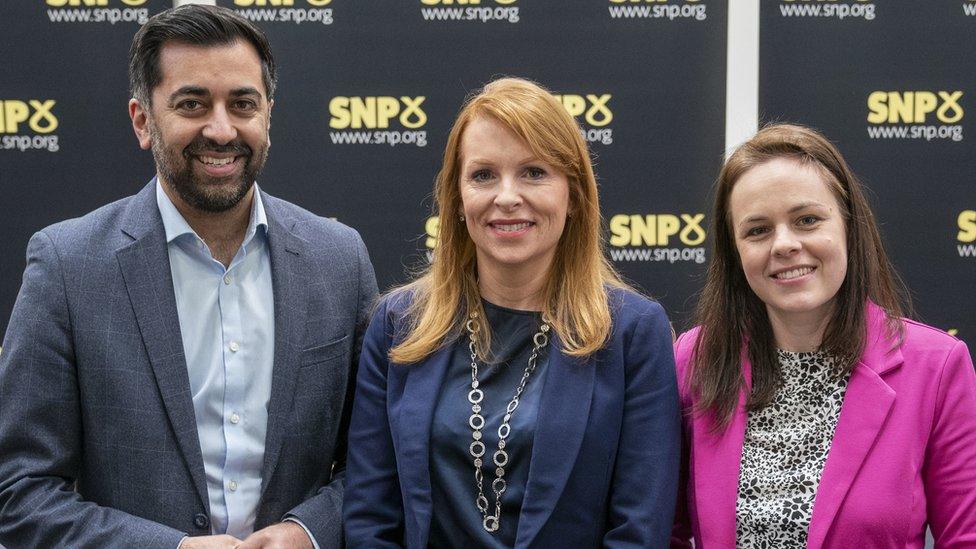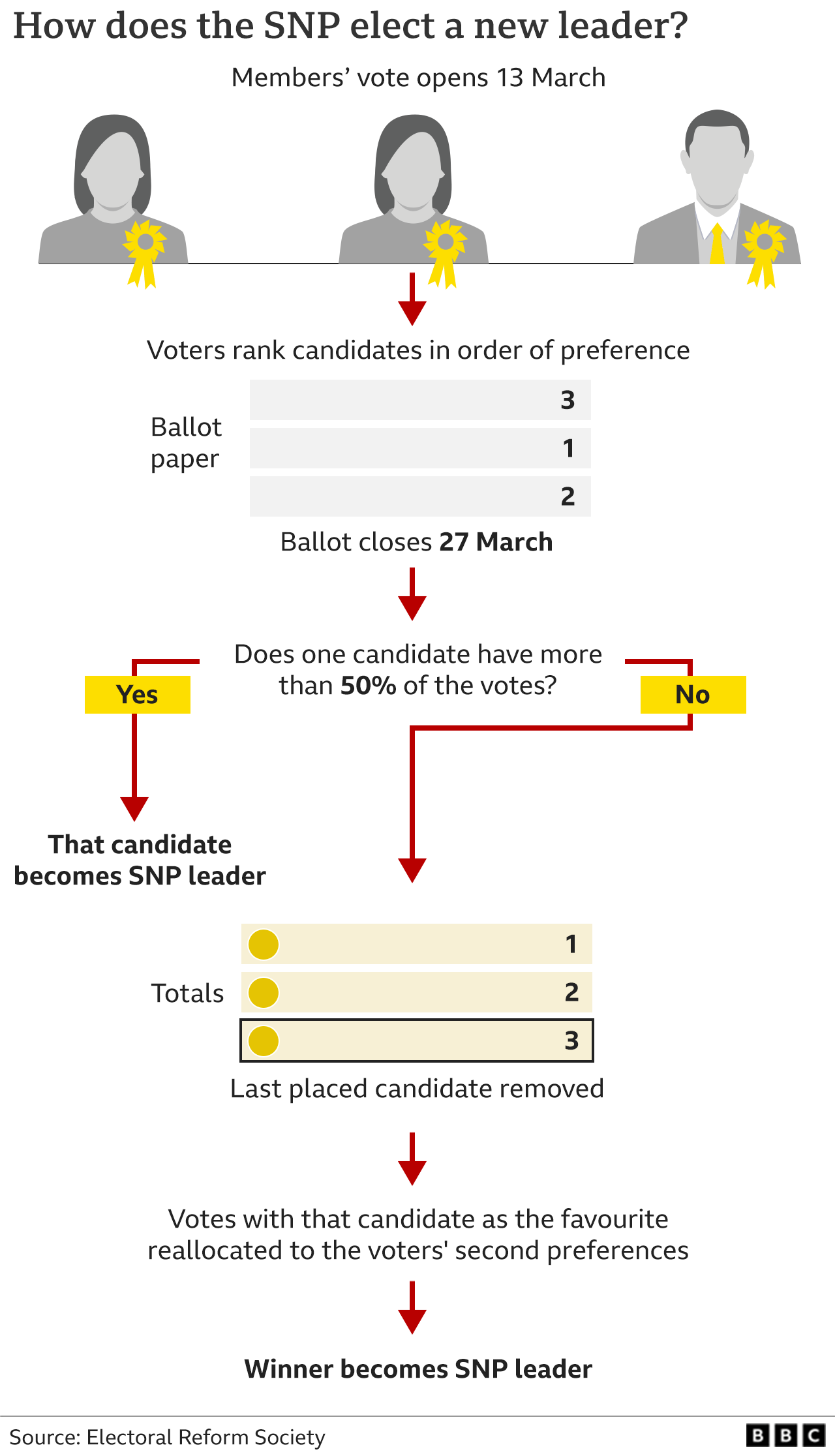SNP to announce Nicola Sturgeon's successor
- Published

Humza Yousaf, Ash Regan and Kate Forbes are the three candidates in the contest to succeed Nicola Sturgeon
The winner of the contest to succeed Nicola Sturgeon as SNP leader is to be announced later.
Ash Regan, Humza Yousaf and Kate Forbes have been standing in the race, with the successful candidate to be revealed in Edinburgh at about 14:00 BST.
The winner will face a vote at Holyrood on Tuesday before also being confirmed as Scotland's new first minister.
Ms Sturgeon announced last month that she was standing down after more than eight years in the roles.
The online ballot of SNP members closed at midday, with the result to be announced two hours later by SNP national secretary Lorna Finn in front of an audience of about 300 people at Murrayfield Stadium.
It is the first time the SNP has had a leadership contest since 2004, with Ms Sturgeon being unopposed when she replaced Alex Salmond in 2014.
Whoever wins will become only its fifth leader since 1979, and will face the task of uniting a party that has dominated Scottish politics in recent years but which has looked deeply divided in the wake of Ms Sturgeon's resignation.
Bookmakers have Health Secretary Mr Yousaf - seen as Ms Sturgeon's preferred successor - as the clear favourite to win the leadership election, which is being held under the Single Transferrable Vote system.
However, polling expert Prof Sir John Curtice said Ms Forbes, who has been on maternity leave from her finance secretary role, appears to be more popular than Mr Yousaf among Scottish voters as a whole.
Meanwhile, Ms Regan is best known for quitting as a junior minister over the Scottish government's controversial gender recognition reforms, and is generally regarded as being the outsider in the contest.
But Sir John said there had been little polling of SNP members during the campaign, and therefore "none of us know what is going to happen" - with the outcome potentially hinging on who voters put as their second-choice candidate.
Nicola Sturgeon addressed the Holyrood chamber for the last time as first minister on Thursday
Ms Sturgeon's surprise announcement that she was resigning came just three weeks after she insisted that she had "plenty in the tank" and still believed she would lead Scotland to independence.
Her husband, Peter Murrell, quit as the SNP's chief executive midway through the leadership contest after being forced to admit its membership had fallen from 104,000 to 72,000 since December 2021.
The party previously ridiculed newspaper reports that it had lost 30,000 members, and had refused to tell the three candidates how many people would be able to vote in the leadership election.
SNP media chief Murray Foote also resigned over the row, with the party still facing a police probe, external over the use of £600,000 which was raised by activists who were told it would be ringfenced for a second independence referendum, and questions over why Mr Murrell gave the SNP a loan of more than £100,000 in June 2021.
The party and Mr Murrell both deny they have done anything wrong, with Ms Sturgeon saying she "can't recall", external when she first learned of her husband's six-figure loan and that the "resources that he lent to the party were resources that belonged to him".
Mr Yousaf has denied allegations that the contest was specifically designed by the party hierarchy to help him win, with both of his rivals questioning the fairness and transparency of the process.

Who are the SNP leadership candidates?

Kate Forbes: The finance secretary who found herself at the centre of a storm over her views on gay marriage
Ash Regan: The minister who quit over Scotland's gender reforms and now wants to unite the independence movement
Humza Yousaf: The 'continuity candidate' with the backing of the SNP leadership

The early stages of the race saw Ms Forbes, a member of the evangelical Free Church of Scotland, come under fire from senior SNP figures, including Deputy First Minister John Swinney, over her conservative views on social issues such as gay marriage, abortion, trans rights and having children outside marriage.
Mr Swinney - a staunch ally of Ms Sturgeon for decades - is also set to leave the government once a successor is appointed.
Ms Forbes later hit back by slating the competence of Mr Yousaf in a live TV debate, while also launching thinly-veiled criticism of Ms Sturgeon when she said that "more of the same" would be an "acceptance of mediocrity".
The attack did little to placate those colleagues who were already pondering whether they could serve under Ms Forbes because of her views on social issues - with the SNP's deputy leader at Westminster, Mhairi Black, warning that the party could split if the finance secretary wins.

The new leader will immediately face having to make a host of tough decisions, including whether to fight the UK government's block on Scotland's gender reforms in the courts - only Mr Yousaf says he wants to - and what to do with other controversial polices inherited from Ms Sturgeon such as the deposit return scheme and new national care service.
They will also find themselves in charge of a health service with record waiting times and an education system that has so far shown little sign of achieving Ms Sturgeon's mission of closing the wide attainment gap between the wealthiest and most deprived pupils.
There is also doubt about the future of the SNP's power sharing agreement at Holyrood with the Scottish Greens if either Ms Forbes or Ms Regan become first minister because of their opposing views on issues such as gender self-identification and economic development.
Green co-leaders Patrick Harvie and Lorna Slater said at the weekend that the new first minister must have "progressive values" if the agreement is to continue, and that a commitment to climate justice and trans rights were "non-negotiable".
Much of the focus of the contest has been on how the candidates would look to build support for independence, with polls suggesting that it remains broadly where it was when Ms Sturgeon took over the party leadership after the referendum in 2014 - although it has fluctuated over that time.
Despite the turmoil that has hit the party over the past month, Ms Sturgeon has said that she is leaving whoever replaces her with a "brilliant foundation" on which to build, pointing to her eight election victories as party leader and first minister.
She has also dismissed suggestions from some within her party - including its interim chief executive Michael Russell - that the SNP is currently in "a mess", insisting that it was instead merely going through "growing pains" that are "necessary but difficult".
The outgoing first minister carried out her final official engagement before leaving office on Friday, when she opened a £33m treatment centre for orthopaedic surgery in Kirkcaldy.
Ms Sturgeon had been given a standing ovation in the Scottish Parliament the previous day, when she said her time as first minister "truly has been the privilege of my lifetime" and thanked Scots for "placing your trust in me".
It is not yet known what she will do after leaving office - beyond learning to drive and "probably" writing a book about her 30 years in politics - but few expect her to still be serving as a backbench MSP when the next Holyrood election is held in 2026.
The UK government's Scottish secretary, Alister Jack, has urged whoever replaces Ms Sturgeon to "turn from confrontation to collaboration" in their relationship with Westminster, saying that the "fundamental political differences" between them should not stop the two governments working together to improve people's lives.
Scottish Labour leader Anas Sarwar claims that the new first minister will have no mandate to govern and has called for a Holyrood election to be held - pointing to similar demands made by Ms Sturgeon for a general election during last year's Conservative leadership contest.